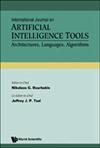Correlating the Community Structure of Constraint Satisfaction Problems with Search Time
IF 1
4区 计算机科学
Q4 COMPUTER SCIENCE, ARTIFICIAL INTELLIGENCE
International Journal on Artificial Intelligence Tools
Pub Date : 2022-11-01
DOI:10.1142/s0218213022600041
引用次数: 0
Abstract
A constraint satisfaction problem (CSP) is, in its most general form, an NP-complete problem. One of the several classes of tractable problems that exist contains all the problems with a restricted structure of the constraint scopes. This paper studies community structure, a particular type of restricted structure underpinning a class of tractable SAT problems with potentially similar relevance to CSPs. Using the modularity, it explores the community structure of a wide variety of problems with both academic and industrial relevance. Its impact on the search times of several general solvers, as well as one that uses tree-decomposition, is also analysed to determine whether constraint solvers exploit this type of structure. Nearly all CSP instances have a strong community structure, and those belonging to the same class have comparable modularity values. For the general solvers, strong correlations between the community structure and the search times are not apparent. A more definite correlation exists between the modularity and the search times of the tree-decomposition, suggesting that it might, in part, be able to take advantage of the community structure. However, combined with the relatively strong correlation between the modularity and the tree-width, it could also indicate a similarity between these two measures.约束满足问题的群体结构与搜索时间的关系
约束满足问题(CSP)在其最一般的形式下是一个np完全问题。存在的几类可处理问题中的一类包含了具有约束范围的受限结构的所有问题。本文研究了社区结构,这是一种特殊类型的限制结构,支持一类与csp具有潜在相似相关性的可处理的SAT问题。使用模块化,它探索具有学术和工业相关性的各种问题的社区结构。它对几种一般求解器以及使用树分解的求解器的搜索时间的影响也进行了分析,以确定约束求解器是否利用了这种类型的结构。几乎所有的CSP实例都具有强大的社区结构,属于同一类的实例具有可比较的模块化值。对于一般解算器,社团结构与搜索时间之间的强相关性并不明显。模块化和树分解的搜索时间之间存在更明确的相关性,这表明它可能在一定程度上能够利用社区结构。然而,结合模块化和树宽度之间相对较强的相关性,它也可以表明这两个测量之间的相似性。
本文章由计算机程序翻译,如有差异,请以英文原文为准。
求助全文
约1分钟内获得全文
求助全文
来源期刊

International Journal on Artificial Intelligence Tools
工程技术-计算机:跨学科应用
CiteScore
2.10
自引率
9.10%
发文量
66
审稿时长
8.5 months
期刊介绍:
The International Journal on Artificial Intelligence Tools (IJAIT) provides an interdisciplinary forum in which AI scientists and professionals can share their research results and report new advances on AI tools or tools that use AI. Tools refer to architectures, languages or algorithms, which constitute the means connecting theory with applications. So, IJAIT is a medium for promoting general and/or special purpose tools, which are very important for the evolution of science and manipulation of knowledge. IJAIT can also be used as a test ground for new AI tools.
Topics covered by IJAIT include but are not limited to: AI in Bioinformatics, AI for Service Engineering, AI for Software Engineering, AI for Ubiquitous Computing, AI for Web Intelligence Applications, AI Parallel Processing Tools (hardware/software), AI Programming Languages, AI Tools for CAD and VLSI Analysis/Design/Testing, AI Tools for Computer Vision and Speech Understanding, AI Tools for Multimedia, Cognitive Informatics, Data Mining and Machine Learning Tools, Heuristic and AI Planning Strategies and Tools, Image Understanding, Integrated/Hybrid AI Approaches, Intelligent System Architectures, Knowledge-Based/Expert Systems, Knowledge Management and Processing Tools, Knowledge Representation Languages, Natural Language Understanding, Neural Networks for AI, Object-Oriented Programming for AI, Reasoning and Evolution of Knowledge Bases, Self-Healing and Autonomous Systems, and Software Engineering for AI.
 求助内容:
求助内容: 应助结果提醒方式:
应助结果提醒方式:


